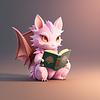Take a photo of a barcode or cover
It starts out almost silly, and you laugh along with the narrator. By the end you are numb, as is she. It isn't the first time this dystopian future has been imagined, but I'm glad that Louise Erdrich has written her version, and that I have read it.
challenging
dark
funny
reflective
sad
tense
fast-paced
Plot or Character Driven:
A mix
Strong character development:
Yes
Loveable characters:
Yes
Diverse cast of characters:
Yes
Flaws of characters a main focus:
Yes
Part 2 was incredible. The ending was a surprise and gutted me.
dark
emotional
mysterious
slow-paced
Plot or Character Driven:
Plot
Strong character development:
No
Loveable characters:
No
Flaws of characters a main focus:
No
Terwijl er een soort apocalyps aan de gang is schrijft de zwangere Cedar in een notitieboek voor haar toekomstige kind haar belevenissen. In de brieven zit het vol van filosofische gedachten, literaire uitspattingen over het leven en excentrieke figuren.
Een boekt wat je continue heen en weer trekt tussen hoop en wanhoop. Doet een beetje denken aan Margarat Atwood’s Het Verhaal van de Dienstmaagd. Interessant boek om te lezen!
Een boekt wat je continue heen en weer trekt tussen hoop en wanhoop. Doet een beetje denken aan Margarat Atwood’s Het Verhaal van de Dienstmaagd. Interessant boek om te lezen!
kind of hard to follow if you’re looking for detail and structure. Sometimes wanted stronger editing ! Incredible and provocative. I keep thinking about my friend who is waiting to have top surge until after they’ve nursed all the babes they can and I keep thinking about how much I love the winter in Minnesota and that it will never be colder than this year.
I am not the first to say this, I know, but the dystopian novel is a real hype, lately (and these corona-times certainly aren't going to change that). In the wake of the television series based on Margaret Atwood's Handsmaid Tale (1985) numerous authors venture into the genre. So now Louise Erdrich too, and this book occupies a very special place in her oeuvre.
Of course, like in her other books, this one also has several links to Native American culture: The protagonist, the 26-year-old Cedar (Mary) Hawk Songmaker, is related to the Ojibwe tribe, near Minnesota; as an adoption child she grew up in a very progressive family. In the course of the story she seeks out her original family, which, like Erdrich's previous novels, provides both a disturbing and intriguing insight into the life and magic of the Native American world.
What about dystopia? Initially this remains relatively limited. The pregnant Cedar begins to write letters to her unborn child, because there are vague indications of things going wrong in the world, especially in nature. There are references to climate shifts, but especially to peculiar natural phenomena, such as the return of disappeared animal species (the saber-toothed tiger, and even a dynosaurus species). As central authority collapses (it is not clear why), there are rumours that natural evolution has stalled and is moving in reverse. And so we end up directly with Cedar and her unborn child.
In the long first part, those dystopian elements remain in the background and the story focuses almost entirely on the rediscovery of Cedar's original family. But especially in the second part, there is a rapid succession of dramatic twists, which are the result of the hunt on pregnant women by fundamentalist Christian militias who meanwhile are in charge. Of course, you can't help but think of Atwood here. And certainly the ending of the novel almost seems like a copy of the Handsmaid Tale.
Compared to Atwood, Erdrich gives much stronger ecological accents and her protagonist is also much nicer, more optimistic. The magical-realistic elements from Native American culture also give this novel its own character. But still you are left with the question what exactly was Erdrich's message, and to what extent it differs or not from Atwood's. In addition, some twists in the story are very unlikely, some interesting characters (such as surrogate father Eddy) remain underexposed, other characters look very much like cardboard and the style varies of Cedar’s letters varies between Young Adult and a philosophical tract about the place of man in evolution. Though some passages are unparalleled and remind us of the better Erdrich novels, at the end this book leaves you with much loose ends and the uncomfortable question what all this really meant. I guess it didn’t resonate with me, but still, this is Erdrich, so 2 stars.
Of course, like in her other books, this one also has several links to Native American culture: The protagonist, the 26-year-old Cedar (Mary) Hawk Songmaker, is related to the Ojibwe tribe, near Minnesota; as an adoption child she grew up in a very progressive family. In the course of the story she seeks out her original family, which, like Erdrich's previous novels, provides both a disturbing and intriguing insight into the life and magic of the Native American world.
What about dystopia? Initially this remains relatively limited. The pregnant Cedar begins to write letters to her unborn child, because there are vague indications of things going wrong in the world, especially in nature. There are references to climate shifts, but especially to peculiar natural phenomena, such as the return of disappeared animal species (the saber-toothed tiger, and even a dynosaurus species). As central authority collapses (it is not clear why), there are rumours that natural evolution has stalled and is moving in reverse. And so we end up directly with Cedar and her unborn child.
In the long first part, those dystopian elements remain in the background and the story focuses almost entirely on the rediscovery of Cedar's original family. But especially in the second part, there is a rapid succession of dramatic twists, which are the result of the hunt on pregnant women by fundamentalist Christian militias who meanwhile are in charge. Of course, you can't help but think of Atwood here. And certainly the ending of the novel almost seems like a copy of the Handsmaid Tale.
Compared to Atwood, Erdrich gives much stronger ecological accents and her protagonist is also much nicer, more optimistic. The magical-realistic elements from Native American culture also give this novel its own character. But still you are left with the question what exactly was Erdrich's message, and to what extent it differs or not from Atwood's. In addition, some twists in the story are very unlikely, some interesting characters (such as surrogate father Eddy) remain underexposed, other characters look very much like cardboard and the style varies of Cedar’s letters varies between Young Adult and a philosophical tract about the place of man in evolution. Though some passages are unparalleled and remind us of the better Erdrich novels, at the end this book leaves you with much loose ends and the uncomfortable question what all this really meant. I guess it didn’t resonate with me, but still, this is Erdrich, so 2 stars.
challenging
dark
emotional
reflective
sad
tense
medium-paced
Plot or Character Driven:
A mix
Strong character development:
Yes
Loveable characters:
Complicated
Diverse cast of characters:
Yes
Flaws of characters a main focus:
Complicated
Graphic: Child death, Infertility, Racism, Sexual assault, Slavery, Suicide, Torture, Violence, Forced institutionalization, Medical content, Trafficking, Religious bigotry, Medical trauma, Murder, Pregnancy
There is an adopted character who is lied to about the circumstances of her adoption and her birth parents . There is desecration of the corpse of a newborn by animals .
In my search for deeper meaning within "Future Home of the Living God," I found myself grasping at straws. The narrative left me waiting for a revelation that never seemed to arrive. While the plot occasionally intrigued me, and the prose possessed a lyrical quality that engaged my senses, the novel ultimately fell short of its potential.
However, the text spends very little time engaging with the dystopian aspect of the novel, that being the devolution of humanity idea (evolution going backwards with all species becoming more primitive at an alarming rate). The author has done next to no world building in this book and has seemingly done no research to answer the questions she raises by her fascinating premise that is never fully developed. There was so much confusion regarding the infertility dystopia that was never resolved. While ambiguity can sometimes enhance a narrative, in this case, it felt more like a missed opportunity, rendering the text disappointingly shallow. Furthermore, the ending of the book felt like the author just gave up.
My favorite character was Eddy, and his constant search to find something to live for every day. I admired that with the apocalypse he was able to find purpose on the reservation, to take back the Indigenous lands that were stolen from the people.
In summary, "Future Home of the Living God" tantalizes with its premise but ultimately fails to deliver a fully realized exploration of its dystopian world, leaving readers craving a more substantial narrative payoff.
However, the text spends very little time engaging with the dystopian aspect of the novel, that being the devolution of humanity idea (evolution going backwards with all species becoming more primitive at an alarming rate). The author has done next to no world building in this book and has seemingly done no research to answer the questions she raises by her fascinating premise that is never fully developed. There was so much confusion regarding the infertility dystopia that was never resolved. While ambiguity can sometimes enhance a narrative, in this case, it felt more like a missed opportunity, rendering the text disappointingly shallow. Furthermore, the ending of the book felt like the author just gave up.
My favorite character was Eddy, and his constant search to find something to live for every day. I admired that with the apocalypse he was able to find purpose on the reservation, to take back the Indigenous lands that were stolen from the people.
In summary, "Future Home of the Living God" tantalizes with its premise but ultimately fails to deliver a fully realized exploration of its dystopian world, leaving readers craving a more substantial narrative payoff.
dark
mysterious
tense
medium-paced
dark
sad
tense
slow-paced
Plot or Character Driven:
A mix
Strong character development:
Yes
Loveable characters:
Complicated
Diverse cast of characters:
Yes
Flaws of characters a main focus:
Yes
Oh what a ride… a very perverse look into a society that’s absolutely lost its mind. I found Cedar to be a little bit unlikeable, I was still extremely stressed out for her regardless. I didn’t quite understand the apocalyptic part about this apocalypse… the panic seemed a bit forced. The treatment of the captives is absolutely horrifying though. Pt 2 was the high part of the book while I felt that Pt 1 and especially Pt 3 dragged on for a little bit. She introduced a good number of social issues, but didn’t have a lot to say about any of it considering Cedar’s parents weird obsession with forcing a fake Native culture on her for her entire childhood. Good twists though, I was thoroughly shocked many times. Eddy and Sweetie were my favorites.








